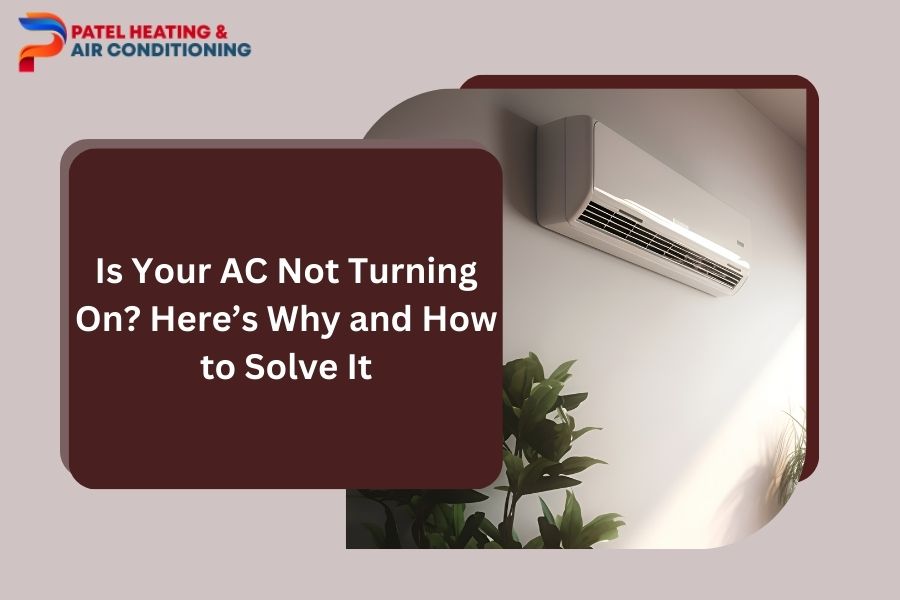Is Your AC Not Turning On? Here’s Why and How to Solve It

When the summer heat is at its peak, the last thing you want is for your air conditioner (AC) to stop working. If your AC isn’t turning on, it can quickly become a major source of discomfort. In this blog post, we'll explore common reasons why your AC won’t turn on and provide practical solutions to help you get it running again.
Common Reasons Why Your AC Won’t Turn On
1. Power Issues
● Tripped Circuit Breaker: One of the most common reasons for an AC not turning on is a tripped circuit breaker. Check your breaker panel and reset any tripped breakers.
● Blown Fuse : If the fuse in the AC’s disconnect box is blown, it can prevent the unit from turning on. Replace the fuse if necessary.
● Loose or Disconnected Wiring: Loose or disconnected wiring can disrupt power to your AC. Inspect the wiring and secure any loose connections.
2. Thermostat Problems
● Incorrect Settingsg: Ensure your thermostat is set to "cool" and the temperature is set lower than the current room temperature.
● Dead Batteries : If your thermostat is battery-operated, check and replace dead batteries.
● Malfunctioning Thermostat: A faulty thermostat may not send the correct signals to your AC unit. Consider replacing the thermostat if it’s malfunctioning.
3. Clogged Air Filters
● Dirty or clogged air filters can restrict airflow, causing the AC to overheat and shut down. Replace or clean the air filters regularly to ensure proper airflow.
4. Frozen Evaporator Coils
● Frozen evaporator coils can prevent your AC from working. If you notice ice buildup, turn off the unit and allow the coils to thaw. Make sure to check for and address any underlying issues, such as restricted airflow or low refrigerant levels.
5. Refrigerant Issues
● Low refrigerant levels or leaks can prevent your AC from cooling properly. If you suspect a refrigerant issue, contact a professional HVAC technician to inspect and recharge the system.
6. Faulty Capacitors
● Capacitors provide the initial boost of energy to start the AC’s motors. A faulty capacitor can prevent your AC from turning on. If you hear a clicking sound when the unit tries to start, it may be a capacitor issue that needs professional attention.
7. Dirty Condenser Coils
● Dirty or blocked condenser coils can cause the AC to overheat and shut down. Clean the condenser coils regularly to maintain efficient operation.
How to Solve the Problem
1. Check Power Supply
● Ensure your AC unit is receiving power. Reset any tripped breakers, replace blown fuses, and secure loose wiring.
2. Inspect the Thermostat
● Verify that the thermostat settings are correct and replace dead batteries. If the thermostat is malfunctioning, consider upgrading to a newer model.
3. Replace Air Filters
● Regularly replace or clean air filters to prevent airflow restrictions and overheating.
4. Defrost Evaporator Coils
● If the evaporator coils are frozen, turn off the AC and let the coils thaw. Check for underlying issues such as blocked vents or low refrigerant levels.
5. Recharge Refrigerant
● Contact a professional HVAC technician to inspect and recharge the refrigerant levels if necessary.
6. Replace Faulty Capacitors
● If you suspect a capacitor issue, have a professional technician inspect and replace the faulty capacitors.
7. Clean Condenser Coils
● Regularly clean the condenser coils to ensure efficient operation and prevent overheating.
When to Call a Professional
While some AC issues can be resolved with simple troubleshooting, others require the expertise of a professional HVAC technician. If you've tried the above solutions and your AC still won’t turn on, it’s time to call in a professional. They can diagnose and fix more complex problems, ensuring your AC operates efficiently and reliably.
Conclusion
Dealing with an AC that won’t turn on can be frustrating, especially during the hot summer months. By understanding common causes and solutions, you can troubleshoot and resolve many issues on your own. For more complex problems, don't hesitate to contact a professional HVAC technician. At Patel Heating and Air Conditioning, we're here to help keep your home cool and comfortable. Contact us today for expert ac repair and maintenance services.